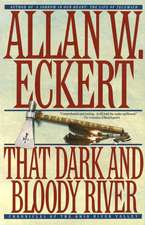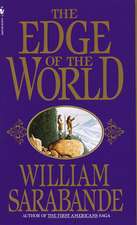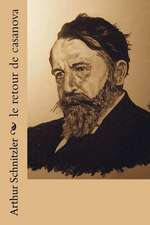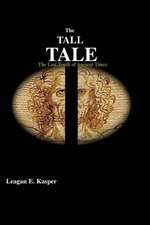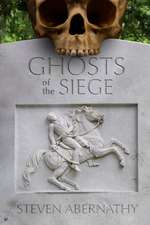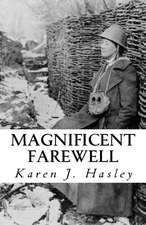Bingo: Runnymede
Autor Rita Mae Brownen Limba Engleză Paperback – 30 iun 1999
Preț: 88.57 lei
Nou
Puncte Express: 133
Preț estimativ în valută:
16.95€ • 17.74$ • 14.02£
16.95€ • 17.74$ • 14.02£
Carte disponibilă
Livrare economică 15-29 martie
Livrare express 01-07 martie pentru 21.39 lei
Preluare comenzi: 021 569.72.76
Specificații
Notă biografică
Rita Mae Brown is the bestselling author of several books. An Emmy-nominated screenwriter and a poet, she lives in Afton, Virginia.
Sneaky Pie Brown, a tiger cat born somewhere in Albemarle County, Virginia, was discovered by Rita Mae Brown at her local SPCA. They have collaborated on fourteen previous Mrs. Murphy mysteries: Sour Puss; Wish You Were Here; Rest in Pieces; Murder at Monticello; Pay Dirt; Murder, She Meowed; Murder on the Prowl; Cat on the Scent; Pawing Through the Past; Claws and Effect; Catch as Cat Can; The Tail of the Tip-Off; Whisker of Evil; and Cat’s Eyewitness, in addition to Sneaky Pie’s Cookbook for Mystery Lovers.
Sneaky Pie Brown, a tiger cat born somewhere in Albemarle County, Virginia, was discovered by Rita Mae Brown at her local SPCA. They have collaborated on fourteen previous Mrs. Murphy mysteries: Sour Puss; Wish You Were Here; Rest in Pieces; Murder at Monticello; Pay Dirt; Murder, She Meowed; Murder on the Prowl; Cat on the Scent; Pawing Through the Past; Claws and Effect; Catch as Cat Can; The Tail of the Tip-Off; Whisker of Evil; and Cat’s Eyewitness, in addition to Sneaky Pie’s Cookbook for Mystery Lovers.
Extras
Chapter One
Flying a Kite
WEDNESDAY . . . 25 MARCH, 1987
Run faster.” “I’m running as fast as I can.” I was too. “Mom, call off Goodyear and Lolly Mabel. I keep tripping over them.”
“Don’t blame it on the dogs. You don’t know how to fly a kite.” Mother did, however, order the dogs to sit by her.
Goodyear, a huge, black male Chow Chow, was originally called Jet Pilot but he grew fatter and fatter, and hence the name Goodyear. Lolly Mabel, his gorgeous red daughter, was my dog, a gift for my birthday two years ago. Lolly and Pewter, my cat, were bosom companions but Pewter didn’t like Goodyear. Not that Goodyear wasn’t the world’s second-best dog, Lolly Mabel being the first, but Mom had taught him to howl and play dead at the mention of her sister’s name, Louise. We had to be careful to call Louise “Wheezie” or “Wheeze” in front of the dog lest Louise discover yet another of her baby sister’s blasphemies. Well, one day I forgot. Luckily, Aunt Louise wasn’t around but Pewter was. When the dreaded name Louise escaped my lips, Goodyear screamed bloody murder, then flopped down “dead.” Pewter, appalled, ran under Mother’s front porch and it took a good hour to coax her out.
The kite shuddered in the air but wouldn’t rise. “Dammit!” I continued to pump my legs.
“Gimme that.” Mother grabbed the string and ran across the lawn. At eighty-two, Julia Ellen Hunsenmeir Smith could still run, and the kite fluted upward. Mother walked backwards now, jerking the string, urging the red kite, with the tail’s many bow ties, higher.
A screech around the corner snapped us away from the graceful sight of the kite to the less graceful sight of Louise taking the corner on two wheels.
“I thought I was going to pick her up. You can’t let her drive.”
“She does what she wants.” Juts observed Louise’s lurching halt in front of her house.
Aunt Louise drove a 1952 Chrysler. Her deceased husband, Paul “Pearlie” Trumbull, hated General Motors, hated the auto business, and hated Detroit. He used to declare that they were nothing better than Ali Baba and the Forty Thieves and every year they’d jack up the price on cars. As it happened, he was right. “If you want to get back on your feet, miss two car payments” was one of Pearlie’s favorite expressions. Well, he never missed a payment, because he drove his Model A Ford until it died around him, but during those decades he saved and saved and then he went out and bought three identical 1952 Chryslers. He drove the one, intending to use the other two for parts, and he figured that if he took good care of his car, which he did, that Chrysler would be driven by his grandchildren and Detroit be damned.
Except for the tires, which Louise wore out with alarming frequency, the black Chrysler looked spanking new. The door opened and shut with a thud. Louise emerged in her blue-haired glory.
“Well?” she demanded.
“Well, what?” Mother replied.
“Do you like it?” Louise stood motionless like a geriatric Greek statue.
“Like what?” Mother was paying more attention to her kite than to Louise.
“You getting cataracts, Julia? My hair! Do you like my hair!”
“Looks like it does every Wednesday when you hit up the Curl ’n Twirl.”
“It does not! You are blind. Nickel, what do you think?”
On the spot, I fibbed. “I like it fine. It’s a little shorter and more youthful-looking.”
“Thank you. At least someone around here has the courtesy to pay attention to me even if it is only my adopted niece. Blood sister doesn’t pay attention to anyone but herself. What are you doing out here flying a kite, anyway? You’re too old for that stuff.”
“It’s your birthday, so I’d lay off the age jokes.”
“You haven’t even wished me a happy birthday!” The shadow of a pout hung on Louise’s cerise lower lip.
“I was going to wait until the party.” Juts reeled in her kite.
“What’d you get me?”
“Wait until the party.”
“Give it to me now. I don’t like presents in front of strangers.”
“Strangers? You’ve known most of the people who’ll be at your party for over eighty years.”
“Not Mr. Pierre.”
Mr. Pierre owned and operated the Curl ’n Twirl. His hair was tinted a delicate shade of lilac. Mr. Pierre was big on tints. “The girls” zipped into his shop on Runnymede Square and zipped out like so many pastel Easter eggs. Mother and Louise had only known Mr. Pierre for perhaps thirty years. Behind his back Mother called him “the bearded lady” but she did love him. When his companion of twenty-eight years died of throat cancer in 1981, all three drew closer together, since each was widowed. Apart from his passion for tints, Mr. Pierre was a good influence on the girls. He insisted they lower their cholesterol, he fought valiantly against refined sugar, and he encouraged them to wear shorts in the summer, old age be damned.
“Aunt . . .” I paused and looked at Goodyear, whose ears pricked up in anticipation of his trick. “. . . Wheezie, let me drive you all over to your party.” Goodyear’s ears drooped a little.
“No, I’ll drive. I might want to stay later than you do.”
Mother and I glanced at each other and decided the fight wouldn’t be worth it. Everyone in Runnymede, both North and South, knew the 1952 Chrysler and they scooted off the road when they saw Louise coming. Visitors quickly learned to do the same. The novelty of a town’s being divided in half by the Mason-Dixon Line drew a small stream of tourists, like ants to a picnic. Once they saw the perfect town square, the statue of the Yankee general astride his horse on the Pennsylvania side and the statue of the Confederate soldiers on the Maryland side along with the cannon, they usually had a sandwich and homemade ice cream at Mojo’s and then left—unless they encountered Louise behind the wheel, in which case they left immediately.
Mother put Goodyear and Lolly Mabel in the house. Usually she took Goodyear over to Saint Rose of Lima’s Catholic Church, the site of her once-a-week, hotly contested bingo games and the site of tonight’s birthday party. However, as the assembled friends, acquaintances, and enemies would undoubtedly sing “Happy Birthday, Louise,” Goodyear would fall into his faint after the hideous howl, so Mom thought better of it.
Aunt Louise, excited to get to her party, revved her motor as Mother and I slammed the doors of my Jeep. Before I could hit the ignition, she was leaving rubber on Lee Street.
“Crazy girl,” Mother said. “I’ve tried to get her to slow down. She won’t listen.”
“She’s amenable to money if not to reason. We could bribe her.” I let up on the clutch and we were off.
“Yeah—with our many millions.” Mother laughed.
By the time I pulled into the crowded parking lot at the church, Louise, her turquoise cape fluttering, was stepping through the back door.
After I parked the Jeep, Mom and I trotted through the parking lot. Wheezie, in her haste, had left her motor running. Mother reached in, turned off the car, and pocketed the keys. She shook her head and then sailed past me into the warm bosom of Saint Rose of Lima’s large hall. I was a few steps behind, loaded with packages.
“Mom cherie!” Mr. Pierre greeted Juts. “Ma cherie!” He kissed me on the cheeks. Gentleman that he was, he helped me with the presents and we put them on the table, already piled high with what I knew would be junk once unwrapped.
A huge banner that read happy 39, louise! hung over the little bandstand. About one hundred and fifty souls were jammed in the room and Louise was in her glory. It was going to be a long night, because not only would we live it, we would be forced to relive it almost daily hereafter.
“Aunt Wheezie’s hair looks divine.”
“Why, thank you, Nickel. You know she’s très chic.” He pronounced chic like “chick” and winked.
Mr. Pierre always treated me with conspiratorial glee. We were the only two openly gay people in Runnymede. The other nonheterosexuals were straight in Runnymede and gay when they left it. Worse, their spouses never knew, and I thought that deception pretty rotten. Naturally, both Mr. Pierre and I suffered every excuse known to God and man when we’d run into our “friends of Bertha’s” as Mr. Pierre called other gay people. They “admired” our bravery but left us to it quite alone. At any rate, being gay in Runnymede was a fairly dismal prospect and I understood everyone’s circumspection or cowardice, and yet I still couldn’t understand how anyone could spend a lifetime lying for the good opinion of people who also had feet of clay. In that, Mr. Pierre was my ally. If he played the part of a queen, well, he was a man and he had grown up in a different time than I did, with different pressures. No matter when he was born he would have been a naturally flamboyant character, just as I would have been a naturally detached one. If I blended into the landscape and appeared just an average woman, Mr. Pierre glowed like neon. Together we were quite a team and we often found ourselves paired together at social functions, since we were both unmarried.
Marriage was like death in Runnymede. Everybody did it.
My boss at the paper, Charles Falkenroth, waved to me. I waved back.
“I’m surprised Louise still has this many people speaking to her.”
Mr. Pierre laughed. “Do they have any choice?”
“No, I guess not.”
By now Aunt Wheezie had dived into her presents. She was supposed to wait until the cake was delivered and everyone sang to her but the woman’s innate greed took over. As she was wildly unwrapping a lovely package, yellow paper with cerise ribbon to match her lipstick, Mother handed her a telegram.
“This just came.”
“If it just came, Julia, how come you have it?”
“Why shouldn’t I have it?” Mother would have preferred that this birthday fuss be for her, but then Mother wasn’t enjoying her eighty-sixth birthday. Louise was officially acknowledging this to be her eightieth birthday and no one knew for certain her exact age. If Mother knew, she kept the secret, although she was not above dropping judicious hints.
Mother made no secret of her own birthday, March 6, 1905, and it was amusing that each year Mother advanced in years while Louise fell behind. However, Aunt Wheezie would give herself away by saying things like, “You won’t have me around forever,” and “You’re going to miss me when I’m gone.” It should be noted that she had initiated these laments when she hit fifty—or more precisely, when she admitted to being fifty.
I was convinced she’d never die because she’d be afraid she’d miss something.
Furiously, Louise opened the telegram, then squealed. “Orrie Tadia!” Orrie, her best friend, was wintering in Florida. Louise raised her voice, and the congregation, feeling the effects of at least one drink, slowly quieted. “Orrie was robbed in a parking lot of seventy-eight dollars and thirty-two cents by a man armed with a coconut!” She sighed. “Orrie gets all the fun. Nothing ever happens to me.” Then she looked up from the telegram, glanced around the room. “Except for tonight, of course. Thank you all for coming to my eightieth birthday party.”
Ursula Yost, my nemesis and president of the local Delta Delta Delta alumnae association, blabbed, “It’s your eighty-sixth birthday, dear.”
Ursie had a mouth like a manhole cover: It was large and steam came out of it.
Louise glared at her. “You have your version of reality and I have mine.”
“Surely at your age it can’t matter.” Ursie was determined to put her foot in it.
Regina Frost, my best friend and Master of Foxhounds for the Blue and Gray Hunt, gently put her hand under Ursula’s elbow and guided her away from the brewing explosion with Louise. Ursula, tottering under the weight of all her crystal fox-head jewelry, listened most times to Regina. Even Ursie had sense enough to know it’s not a smart idea to cross the M.F.H. in any community.
Just then Regina’s husband, Jackson Frost, the best-looking man in Runnymede, emerged from the kitchen with the cake. Winston and Randolph, his two teenaged sons, helped carry the huge confection. The room erupted into song. Louise cried. I believe half the room cried with her. There wasn’t one person there who could imagine life in Runnymede without Louise, for she had preceded all of us.
The door opened and The Baker’s Dozen, an a cappella singing group, burst through it in full voice.
“Who sent me this present! Who sent me this?” Louise clapped her hands like a happy child.
The lead singer, George Spangler, a lawyer in town, paused after “Silhouette” and said, “Diz Rife.”
A slight pause rippled across the room; then the conversation picked up until George and company launched into “Meet Me in St. Louis, Louise.”
Even Liz Rife made an appearance and apologized for Diz’s—her husband’s—absence. He was in New York on business. In honor of Louise, Liz wore her major jewelry. She was, however, wise enough not to let Louise wear it, even though Louise badgered Liz whenever she saw her in her “Major Stones.” Back in the twenties, Aunt Louise had borrowed a Cartier necklace and earrings from Celeste Chalfonte, a great and rich lady now deceased. These same valuables were not returned until many weeks later because, Louise said, she lost them. Since Louise was so organized that even her dirty clothes were folded in the hamper, this seemed unlikely. From then on, no more loans to Louise from anyone.
Louise, cape now casually hanging off one shoulder, glittered in a gorgeous bugle-bead jacket. Mr. Pierre leaned over her for another kiss. He was tremendously tall.
He nodded in Liz’s direction. “Those diamonds cost her a thousand mistakes.”
“Diamonds are a girl’s best friend,” Louise replied, “but they won’t keep you warm at night.”
Mother, at her sister’s elbow, whispered, “Keep your voice down.”
“Why should I? Everyone knows.” Louise’s voice boomed.
Other conversations quieted. “Everyone knows what?” people seemed to be asking themselves.
Louise noticed this. The last thing she wanted was to cross swords with the powerful Rife family. She spoke to the assemblage: “Did I ever tell you all about my twelfth birthday and Momma gave me a doll. Well, my hateful sister was so jealous she hung it as a Yankee spy.”
Everyone laughed, and Aunt Wheezie, happy in the spotlight, launched into one story after another—most of them at her sister’s expense. Mother must have decided to grin and bear it; either that or she was plotting an elaborate revenge. I never knew with those two.
“Nickel, you’re covering this, of course?” Charles Falkenroth beamed at me. He’d edged over during Louise’s story.
“You don’t think it’s conflict of interest?”
“Hell, everything in Runnymede is conflict of interest.”
Just then Louise emitted another piercing shriek because she opened her sister’s present. The card for a year’s subscription to Playgirl magazine was attached to a lovely framed photo of Louise’s heartthrob, Ronald Colman. “Julia, you pervert!”
“You get what you ask for,” Mother replied.
As 1987 unfolded, this was to be oddly prophetic, but at the time I was busy stuffing myself with devil’s-food birthday cake and wondering why Charles wanted to meet me for lunch tomorrow.
Flying a Kite
WEDNESDAY . . . 25 MARCH, 1987
Run faster.” “I’m running as fast as I can.” I was too. “Mom, call off Goodyear and Lolly Mabel. I keep tripping over them.”
“Don’t blame it on the dogs. You don’t know how to fly a kite.” Mother did, however, order the dogs to sit by her.
Goodyear, a huge, black male Chow Chow, was originally called Jet Pilot but he grew fatter and fatter, and hence the name Goodyear. Lolly Mabel, his gorgeous red daughter, was my dog, a gift for my birthday two years ago. Lolly and Pewter, my cat, were bosom companions but Pewter didn’t like Goodyear. Not that Goodyear wasn’t the world’s second-best dog, Lolly Mabel being the first, but Mom had taught him to howl and play dead at the mention of her sister’s name, Louise. We had to be careful to call Louise “Wheezie” or “Wheeze” in front of the dog lest Louise discover yet another of her baby sister’s blasphemies. Well, one day I forgot. Luckily, Aunt Louise wasn’t around but Pewter was. When the dreaded name Louise escaped my lips, Goodyear screamed bloody murder, then flopped down “dead.” Pewter, appalled, ran under Mother’s front porch and it took a good hour to coax her out.
The kite shuddered in the air but wouldn’t rise. “Dammit!” I continued to pump my legs.
“Gimme that.” Mother grabbed the string and ran across the lawn. At eighty-two, Julia Ellen Hunsenmeir Smith could still run, and the kite fluted upward. Mother walked backwards now, jerking the string, urging the red kite, with the tail’s many bow ties, higher.
A screech around the corner snapped us away from the graceful sight of the kite to the less graceful sight of Louise taking the corner on two wheels.
“I thought I was going to pick her up. You can’t let her drive.”
“She does what she wants.” Juts observed Louise’s lurching halt in front of her house.
Aunt Louise drove a 1952 Chrysler. Her deceased husband, Paul “Pearlie” Trumbull, hated General Motors, hated the auto business, and hated Detroit. He used to declare that they were nothing better than Ali Baba and the Forty Thieves and every year they’d jack up the price on cars. As it happened, he was right. “If you want to get back on your feet, miss two car payments” was one of Pearlie’s favorite expressions. Well, he never missed a payment, because he drove his Model A Ford until it died around him, but during those decades he saved and saved and then he went out and bought three identical 1952 Chryslers. He drove the one, intending to use the other two for parts, and he figured that if he took good care of his car, which he did, that Chrysler would be driven by his grandchildren and Detroit be damned.
Except for the tires, which Louise wore out with alarming frequency, the black Chrysler looked spanking new. The door opened and shut with a thud. Louise emerged in her blue-haired glory.
“Well?” she demanded.
“Well, what?” Mother replied.
“Do you like it?” Louise stood motionless like a geriatric Greek statue.
“Like what?” Mother was paying more attention to her kite than to Louise.
“You getting cataracts, Julia? My hair! Do you like my hair!”
“Looks like it does every Wednesday when you hit up the Curl ’n Twirl.”
“It does not! You are blind. Nickel, what do you think?”
On the spot, I fibbed. “I like it fine. It’s a little shorter and more youthful-looking.”
“Thank you. At least someone around here has the courtesy to pay attention to me even if it is only my adopted niece. Blood sister doesn’t pay attention to anyone but herself. What are you doing out here flying a kite, anyway? You’re too old for that stuff.”
“It’s your birthday, so I’d lay off the age jokes.”
“You haven’t even wished me a happy birthday!” The shadow of a pout hung on Louise’s cerise lower lip.
“I was going to wait until the party.” Juts reeled in her kite.
“What’d you get me?”
“Wait until the party.”
“Give it to me now. I don’t like presents in front of strangers.”
“Strangers? You’ve known most of the people who’ll be at your party for over eighty years.”
“Not Mr. Pierre.”
Mr. Pierre owned and operated the Curl ’n Twirl. His hair was tinted a delicate shade of lilac. Mr. Pierre was big on tints. “The girls” zipped into his shop on Runnymede Square and zipped out like so many pastel Easter eggs. Mother and Louise had only known Mr. Pierre for perhaps thirty years. Behind his back Mother called him “the bearded lady” but she did love him. When his companion of twenty-eight years died of throat cancer in 1981, all three drew closer together, since each was widowed. Apart from his passion for tints, Mr. Pierre was a good influence on the girls. He insisted they lower their cholesterol, he fought valiantly against refined sugar, and he encouraged them to wear shorts in the summer, old age be damned.
“Aunt . . .” I paused and looked at Goodyear, whose ears pricked up in anticipation of his trick. “. . . Wheezie, let me drive you all over to your party.” Goodyear’s ears drooped a little.
“No, I’ll drive. I might want to stay later than you do.”
Mother and I glanced at each other and decided the fight wouldn’t be worth it. Everyone in Runnymede, both North and South, knew the 1952 Chrysler and they scooted off the road when they saw Louise coming. Visitors quickly learned to do the same. The novelty of a town’s being divided in half by the Mason-Dixon Line drew a small stream of tourists, like ants to a picnic. Once they saw the perfect town square, the statue of the Yankee general astride his horse on the Pennsylvania side and the statue of the Confederate soldiers on the Maryland side along with the cannon, they usually had a sandwich and homemade ice cream at Mojo’s and then left—unless they encountered Louise behind the wheel, in which case they left immediately.
Mother put Goodyear and Lolly Mabel in the house. Usually she took Goodyear over to Saint Rose of Lima’s Catholic Church, the site of her once-a-week, hotly contested bingo games and the site of tonight’s birthday party. However, as the assembled friends, acquaintances, and enemies would undoubtedly sing “Happy Birthday, Louise,” Goodyear would fall into his faint after the hideous howl, so Mom thought better of it.
Aunt Louise, excited to get to her party, revved her motor as Mother and I slammed the doors of my Jeep. Before I could hit the ignition, she was leaving rubber on Lee Street.
“Crazy girl,” Mother said. “I’ve tried to get her to slow down. She won’t listen.”
“She’s amenable to money if not to reason. We could bribe her.” I let up on the clutch and we were off.
“Yeah—with our many millions.” Mother laughed.
By the time I pulled into the crowded parking lot at the church, Louise, her turquoise cape fluttering, was stepping through the back door.
After I parked the Jeep, Mom and I trotted through the parking lot. Wheezie, in her haste, had left her motor running. Mother reached in, turned off the car, and pocketed the keys. She shook her head and then sailed past me into the warm bosom of Saint Rose of Lima’s large hall. I was a few steps behind, loaded with packages.
“Mom cherie!” Mr. Pierre greeted Juts. “Ma cherie!” He kissed me on the cheeks. Gentleman that he was, he helped me with the presents and we put them on the table, already piled high with what I knew would be junk once unwrapped.
A huge banner that read happy 39, louise! hung over the little bandstand. About one hundred and fifty souls were jammed in the room and Louise was in her glory. It was going to be a long night, because not only would we live it, we would be forced to relive it almost daily hereafter.
“Aunt Wheezie’s hair looks divine.”
“Why, thank you, Nickel. You know she’s très chic.” He pronounced chic like “chick” and winked.
Mr. Pierre always treated me with conspiratorial glee. We were the only two openly gay people in Runnymede. The other nonheterosexuals were straight in Runnymede and gay when they left it. Worse, their spouses never knew, and I thought that deception pretty rotten. Naturally, both Mr. Pierre and I suffered every excuse known to God and man when we’d run into our “friends of Bertha’s” as Mr. Pierre called other gay people. They “admired” our bravery but left us to it quite alone. At any rate, being gay in Runnymede was a fairly dismal prospect and I understood everyone’s circumspection or cowardice, and yet I still couldn’t understand how anyone could spend a lifetime lying for the good opinion of people who also had feet of clay. In that, Mr. Pierre was my ally. If he played the part of a queen, well, he was a man and he had grown up in a different time than I did, with different pressures. No matter when he was born he would have been a naturally flamboyant character, just as I would have been a naturally detached one. If I blended into the landscape and appeared just an average woman, Mr. Pierre glowed like neon. Together we were quite a team and we often found ourselves paired together at social functions, since we were both unmarried.
Marriage was like death in Runnymede. Everybody did it.
My boss at the paper, Charles Falkenroth, waved to me. I waved back.
“I’m surprised Louise still has this many people speaking to her.”
Mr. Pierre laughed. “Do they have any choice?”
“No, I guess not.”
By now Aunt Wheezie had dived into her presents. She was supposed to wait until the cake was delivered and everyone sang to her but the woman’s innate greed took over. As she was wildly unwrapping a lovely package, yellow paper with cerise ribbon to match her lipstick, Mother handed her a telegram.
“This just came.”
“If it just came, Julia, how come you have it?”
“Why shouldn’t I have it?” Mother would have preferred that this birthday fuss be for her, but then Mother wasn’t enjoying her eighty-sixth birthday. Louise was officially acknowledging this to be her eightieth birthday and no one knew for certain her exact age. If Mother knew, she kept the secret, although she was not above dropping judicious hints.
Mother made no secret of her own birthday, March 6, 1905, and it was amusing that each year Mother advanced in years while Louise fell behind. However, Aunt Wheezie would give herself away by saying things like, “You won’t have me around forever,” and “You’re going to miss me when I’m gone.” It should be noted that she had initiated these laments when she hit fifty—or more precisely, when she admitted to being fifty.
I was convinced she’d never die because she’d be afraid she’d miss something.
Furiously, Louise opened the telegram, then squealed. “Orrie Tadia!” Orrie, her best friend, was wintering in Florida. Louise raised her voice, and the congregation, feeling the effects of at least one drink, slowly quieted. “Orrie was robbed in a parking lot of seventy-eight dollars and thirty-two cents by a man armed with a coconut!” She sighed. “Orrie gets all the fun. Nothing ever happens to me.” Then she looked up from the telegram, glanced around the room. “Except for tonight, of course. Thank you all for coming to my eightieth birthday party.”
Ursula Yost, my nemesis and president of the local Delta Delta Delta alumnae association, blabbed, “It’s your eighty-sixth birthday, dear.”
Ursie had a mouth like a manhole cover: It was large and steam came out of it.
Louise glared at her. “You have your version of reality and I have mine.”
“Surely at your age it can’t matter.” Ursie was determined to put her foot in it.
Regina Frost, my best friend and Master of Foxhounds for the Blue and Gray Hunt, gently put her hand under Ursula’s elbow and guided her away from the brewing explosion with Louise. Ursula, tottering under the weight of all her crystal fox-head jewelry, listened most times to Regina. Even Ursie had sense enough to know it’s not a smart idea to cross the M.F.H. in any community.
Just then Regina’s husband, Jackson Frost, the best-looking man in Runnymede, emerged from the kitchen with the cake. Winston and Randolph, his two teenaged sons, helped carry the huge confection. The room erupted into song. Louise cried. I believe half the room cried with her. There wasn’t one person there who could imagine life in Runnymede without Louise, for she had preceded all of us.
The door opened and The Baker’s Dozen, an a cappella singing group, burst through it in full voice.
“Who sent me this present! Who sent me this?” Louise clapped her hands like a happy child.
The lead singer, George Spangler, a lawyer in town, paused after “Silhouette” and said, “Diz Rife.”
A slight pause rippled across the room; then the conversation picked up until George and company launched into “Meet Me in St. Louis, Louise.”
Even Liz Rife made an appearance and apologized for Diz’s—her husband’s—absence. He was in New York on business. In honor of Louise, Liz wore her major jewelry. She was, however, wise enough not to let Louise wear it, even though Louise badgered Liz whenever she saw her in her “Major Stones.” Back in the twenties, Aunt Louise had borrowed a Cartier necklace and earrings from Celeste Chalfonte, a great and rich lady now deceased. These same valuables were not returned until many weeks later because, Louise said, she lost them. Since Louise was so organized that even her dirty clothes were folded in the hamper, this seemed unlikely. From then on, no more loans to Louise from anyone.
Louise, cape now casually hanging off one shoulder, glittered in a gorgeous bugle-bead jacket. Mr. Pierre leaned over her for another kiss. He was tremendously tall.
He nodded in Liz’s direction. “Those diamonds cost her a thousand mistakes.”
“Diamonds are a girl’s best friend,” Louise replied, “but they won’t keep you warm at night.”
Mother, at her sister’s elbow, whispered, “Keep your voice down.”
“Why should I? Everyone knows.” Louise’s voice boomed.
Other conversations quieted. “Everyone knows what?” people seemed to be asking themselves.
Louise noticed this. The last thing she wanted was to cross swords with the powerful Rife family. She spoke to the assemblage: “Did I ever tell you all about my twelfth birthday and Momma gave me a doll. Well, my hateful sister was so jealous she hung it as a Yankee spy.”
Everyone laughed, and Aunt Wheezie, happy in the spotlight, launched into one story after another—most of them at her sister’s expense. Mother must have decided to grin and bear it; either that or she was plotting an elaborate revenge. I never knew with those two.
“Nickel, you’re covering this, of course?” Charles Falkenroth beamed at me. He’d edged over during Louise’s story.
“You don’t think it’s conflict of interest?”
“Hell, everything in Runnymede is conflict of interest.”
Just then Louise emitted another piercing shriek because she opened her sister’s present. The card for a year’s subscription to Playgirl magazine was attached to a lovely framed photo of Louise’s heartthrob, Ronald Colman. “Julia, you pervert!”
“You get what you ask for,” Mother replied.
As 1987 unfolded, this was to be oddly prophetic, but at the time I was busy stuffing myself with devil’s-food birthday cake and wondering why Charles wanted to meet me for lunch tomorrow.
Descriere
Teeming with the trials, tribulations, and triumphs of small-town life, "Bingo, " a spirited novel about an avowed lesbian living in the South, is certain to appeal as much to the funny bone as it does to the heart.


